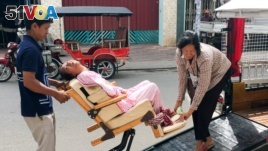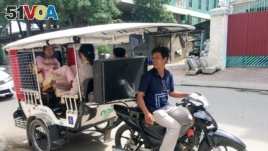08 February, 2017
Reaksmey Mary was disabled with a serious illness when she was six months old. She is confined to a wheelchair and lives with her family on an island in the Mekong River in Cambodia.
As a young child, Reaksmey traveled only to see the doctor near her house.
And after age 10, Reaksmey no longer went anywhere.
Her mother, Khem Vy, age 47, told VOA that, at a certain point, "we could no longer take Mary anywhere by motorbike."
The family tried using a regular tuk-tuk – a small, three-wheeled vehicle common in Cambodia – but that was difficult, as well. The drivers struggled to get Reaksmey and her wheelchair onto the vehicle.

Reaksmey Mary and her mother Khem Vy took mobilituk, a tuk tuk designed for disabled person in Phnom Penh on December 21, 2016. (Hean Socheata/ VOA Khmer)
"The wheelchair is very heavy. I am alone, and I can't do it," Khem said. "We stopped taking her out, so she stayed at home on the bed all the time."
But recently, Reaksmey went with her family for the first time to a shopping mall in Phnom Penh. The trip was made possible by a new service for the physically disabled. The service is called Mobilituk.
Mobilituks are tuk-tuks that have been modified to make transporting the disabled easier. They have a steel ramp that pulls down to allow a wheelchair to roll up.
Agile Design Group, known as ADG, a Phnom Penh-based organization, created Mobilituk. The group specializes in projects that help disabled people have better access to everyday activities.
ADG recognizes that disabled people everywhere face transportation problems. But in developing nations, such as Cambodia, those problems are usually even harder.
Mobilituk has other fans, too. Disability activist and writer John Morris is confined to a wheelchair. Morris travels the world and then writes about his experiences as a traveler with a disability. He said affordable wheelchair transport in developing countries means the disabled are no longer trapped at home.
Far-reaching effects
Cambodia's Ministry of Social Affairs estimates that at least 50,000 people in Cambodia are physically disabled.
Another organization, the Asian Development Bank, estimates that as much as 15% of the Cambodian population lives with physical and mental disabilities.
To reach them, ADG is working with the International Committee of the Red Cross. The two groups plan to increase the number of Mobilituks in the northern areas of Cambodia.
Keogh Johnston, an ADG engineer, told VOA Khmer that the Mobilituk program has been a rewarding project in many ways.

A mobilituk driver Ker Sarout in Phnom Penh on December 20, 2016. (Hean Socheata/ VOA Khmer)
He said that seeing the happiness of someone who can now visit the city and do exciting things makes him want to help more.
Mobilituks also expand opportunities for tuk-tuk drivers. A month after getting his tuk-tuk converted into a Mobilituk, driver Keo Sarout had two disabled riders, including Reaksmey.
Keo said his disabled riders like the Mobilituk better than a car or other vehicle.
And Keo is happy that he can help. "I think I can help society by helping disabled persons, as they find it quite difficult to travel anywhere," he said.
He said that other tuk-tuk drivers are now interested in having the steel ramp in their vehicles.
Happiness
The Mobilituk brings increased risk along with increased freedom for riders. The first time she rode in one, Reaksmey got hurt. Her family believes Reaksmey was injured because, before the ride, she had not moved her body for almost 20 years.
After she recovered, Reaksmey tried again. She has since traveled to the Royal Palace, Independence Monument, shopping malls, and the hospital.
With her mother and an aunt along for the ride, these trips are no longer difficult.
"She feels very happy now," her mother, Khem Vy, said.
Khem asked Reaksmey if she wanted to keep riding in Mobilituks, even after getting hurt.
Reaksmey smiled, signaling her head to say "yes."
I'm Alice Bryant. And I'm Dan Friedell.
Hean Socheata reported this story for VOA Khmer Service. Alice Bryant adapted the report for Learning English. Kelly Jean Kelly was the editor.
We want to hear from you. Write to us in the Comments Section.
__________________________________________________________________
Words in This Story
confined - v. forced to stay in something
wheelchair - n. a chair with wheels that is used by people who cannot walk because they are disabled, sick, or injured
motorbike - n. a small motorcycle
shopping mall - n. a large building or group of buildings containing many different stores
disabled - adj. having a physical or mental disability; unable to perform one or more natural activities (such as walking or seeing) because of illness or injury
ramp - n. a piece of equipment with a slope that is used to join two surfaces that are at different levels or heights
convert - v. to change (something) into a different form or so that it can be used in a different way
monument - n. a building or statue that honors a person or event